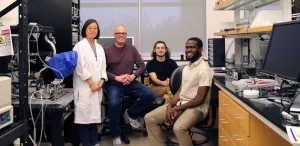(Press-News.org) ATLANTA—A novel type of protein nanoparticle vaccine formulation containing influenza proteins and adjuvant to boost immune responses has provided complete protection against influenza viral challenges, according to a new study published by researchers in the Institute for Biomedical Sciences at Georgia State University.
The findings published in the journal Small describe a promising influenza vaccine candidate that uses adjuvants, substances that increase immune response to a vaccine, to boost effectiveness against viral infections.
The researchers developed a novel type of core/shell protein nanoparticle consisting of influenza nucleoprotein as the core and NA1-M2e or NA2-M2e surface proteins as the coating antigens. In the new nanoparticle fabrication, the surface protein coating can be precisely controlled and any excessive coating proteins can be recovered for reuse. Thus, nanoparticle quality and yield are improved significantly. Mice were intramuscularly or intranasally vaccinated with the resulting protein nanoparticles with and without immune-stimulating complexes as adjuvants to determine the immune response and protective efficiency against influenza viral infections.
“We found that the novel protein nanoparticles combined with the adjuvants could induce significantly improved mucosal immune responses and the accumulation of lung resident memory cells in the local respiratory tracts, providing complete protection against influenza viral infections,” said Dr. Wandi Zhu, first author of the study and a research assistant professor in the Institute for Biomedical Sciences at Georgia State.
Influenza A virus is one of the most threatening respiratory pathogens and can cause severe morbidity, mortality and heavy economic burdens, especially in flu epidemics or pandemics. While vaccination is effective in preventing or reducing viral infections during annual flu seasons, the selection of vaccine strains depends on circulating viral surveillance and prediction. Mismatched strains could significantly impair vaccine efficiency. Also, the production of the current quadrivalent influenza vaccine is time-consuming. New vaccine technologies are needed to easily manufacture a universal influenza vaccine. The researchers have focused their work on developing different types of protein nanoparticle vaccines against both influenza A and influenza B viral infections.
“The epidemics caused by the influenza virus seriously threaten public health and the economy,” said Dr. Baozhong Wang, senior author of the study and Distinguished University Professor in the Institute for Biomedical Sciences at Georgia State. “Adding appropriate adjuvants to improve immunogenicity and finding effective mucosal vaccines to combat respiratory infection at the portal of virus entry are important strategies to boost protection.”
Adjuvanted protein nanoparticles could improve strong systemic and mucosal immune responses conferring protection in different immunization routes. This work highlights the importance of applying adjuvants in mucosal vaccine formulations. The adjuvanted protein nanoparticles can be used as mucosal vaccines alone or in combination with other vaccines to improve mucosal immunity and protection in the future, Zhu explained.
“The new surface protein coating is a more controlled and efficient fabrication method than our previous process, significantly increasing the utilization of the initial proteins,” Zhu said. “The technique could be used to develop universal influenza vaccines consisting of influenza antigens from influenza A and influenza B viruses. The combination of the vaccine with appropriate adjuvants will be promising mucosal vaccine candidates.”
Additional authors of the study were Lai Wei, Chunhong Dong, Joo Kim and Yao Ma of the Institute for Biomedical Sciences at Georgia State; and Jaeyoung Park, Thomas Pho and Julie A. Champion of the Georgia Institute of Technology.
The study is funded by the National Institute of Allergy and Infectious Diseases of the National Institutes of Health.
To read the study, visit https://onlinelibrary.wiley.com/doi/10.1002/smll.202301801.
END
Protein nanoparticle vaccine with adjuvant improves immune response against influenza, biomedical sciences researchers find
2023-05-10
ELSE PRESS RELEASES FROM THIS DATE:
Songs of the oceans raise environmental awareness #ASA184
2023-05-10
CHICAGO, May 10, 2023 – For many people, there are few sounds as relaxing as ocean waves. But the sound of the seas can also convey deeper emotions and raise awareness about pollution.
At the upcoming 184th Meeting of the Acoustical Society of America, Colin Malloy of Ocean Network Canada will present his method to transform ocean data into captivating, solo percussion songs. The talk, “Sonification of ocean data in art-science,” will take place Wednesday, May 10, at 3:25 p.m. in the Indiana/Iowa room. The meeting will run May 8-12 at the Chicago Marriott Downtown Magnificent Mile Hotel.
To construct his compositions, Malloy employs sound from ...
Sleep apnea, lack of deep sleep linked to worse brain health
2023-05-10
EMBARGOED FOR RELEASE UNTIL 4 P.M. ET, WEDNESDAY, MAY 10, 2023
MINNEAPOLIS – People who have sleep apnea and spend less time in deep sleep may be more likely to have brain biomarkers that have been linked to an increased risk of stroke, Alzheimer’s disease and cognitive decline, according to new research published in the May 10, 2023, online issue of Neurology®, the medical journal of the American Academy of Neurology. The study does not prove that these sleep disturbances cause the changes ...
Virginia Tech researchers conduct proof-of-concept study on mosquito’s scent preferences
2023-05-10
Humans smell. Each and every person has a unique body odor.
People have been using commercial products to alter their scent for generations. From soaps to perfumes, people gravitate to floral and fruity smells.
Whether we think these smells are good or bad is of little consequence to mosquitoes, transmitters of diseases that kill hundreds of thousands of people each year. Additionally, mosquitoes rely on plant nectar to get some sugars needed to sustain their metabolism in addition to needing nutrients in the blood to produce eggs.
And humans with nutrients and a floral scent? That’s two strikes.
In spite of these scents being right under humans’ noses, the impact of ...
Older adults are more easily distracted, study reports
2023-05-10
RIVERSIDE, Calif. -- While engaged in a physical task requiring effort, such as driving a car or carrying grocery bags, older adults are more likely than younger adults to be distracted by items irrelevant to the task at hand, a University of California, Riverside, study reports.
The study assessed the interaction between physical exertion and short-term memory performance when distractors were present or absent in younger and older adults.
“Action and cognition, which interact often in daily life, are sensitive to the effects of aging,” said graduate student Lilian Azer, the first author of the research paper published ...
Texas A&M Institute for Advancing Health through Agriculture seeks experts to support study on responsive agriculture
2023-05-10
College Station, Texas (May 10, 2023) – Texas A&M’s Institute for Advancing Health Through Agriculture (IHA) is spearheading a study that focuses on advancing the concept of responsive agriculture and is seeking experts and leaders in the agriculture-food value chain to serve one of its three committees. The committees, along with a recently named Task Force, will help develop a road map to achieve responsive agriculture, an agricultural system and food environment that supports health ...
How does the brain interpret taste?
2023-05-10
NORMAN, OKLA. – Taste is a complex neurological experience that has the potential to provide extensive, and perhaps surprising, information on how the brain makes sense of sensations and the organization of brain pathways. A research project funded by the National Institutes of Health, led by Christian H. Lemon, Ph.D., an associate professor in the Department of Biology in the Dodge Family College of Arts and Sciences, aims to better understand how the brain processes taste and how those neural pathways can evolve.
Taste ...
ACM and CSTA announce 2022-2023 Cutler-Bell student winners
2023-05-10
The Association for Computing Machinery (ACM) and the Computer Science Teachers Association (CSTA) announced four high school students were selected from among a pool of graduating high school seniors throughout the US for the ACM/CSTA Cutler-Bell Prize in High School Computing. Eligible students applied for the award by submitting a project/artifact that engages modern technology and computer science. A panel of judges selected the recipients based on the ingenuity, complexity, relevancy, and originality of their projects.
The Cutler-Bell Prize promotes ...
Abdominal aortic aneurysm: new treatment may reduce size; COVID infection may speed growth
2023-05-10
Research Highlights
Abdominal aortic aneurysm, a weakening and ballooning of the aorta, the largest blood vessel in the body, may result in a life-threatening rupture.
In a small, preliminary study examining a potential treatment to keep small abdominal aortic aneurysms from growing to a dangerous size, intravenous administration of immune-modulating cells resulted in a significant decrease in pro-inflammatory cells, and with higher doses, there was a decrease in aneurysm size.
In a separate small study, people with abdominal aortic aneurysms ...
Detecting neutrinos from nuclear reactors with water
2023-05-10
The Science
Neutrinos are subatomic particles that interact with matter extremely weakly. They are produced in many types of radioactive decays, including in the core of the Sun and in nuclear reactors. Neutrinos are also impossible to block—they easily travel from the core of a nuclear reactor to a detector far away, and even through the Earth itself. Detecting the tiny signals from neutrinos therefore requires huge devices that are extremely sensitive. The SNO+ experiment has just shown that a detector filled with simple water can still detect reactor neutrinos, even though the neutrinos create only tiny signals in the detector.
The ...
When A.I. discloses personal information, users may empathize more
2023-05-10
In a new study, participants showed more empathy for an online anthropomorphic artificial intelligence (A.I.) agent when it seemed to disclose personal information about itself while chatting with participants. Takahiro Tsumura of The Graduate University for Advanced Studies, SOKENDAI in Tokyo, Japan, and Seiji Yamada of the National Institute of Informatics, also in Tokyo, present these findings in the open-access journal PLOS ONE on May 10, 2023.
The use of A.I. in daily life is increasing, raising interest in factors that might contribute to the level of trust and acceptance people feel towards A.I. agents. Prior research has suggested that people are ...








